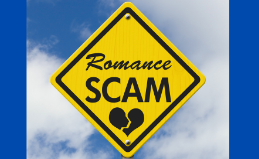Romance Scams

According to the Federal Trade Commission (FTC), online
romance scams reached a record $304 million in losses in 2020. This is a huge
increase of 50% over 2019. With the pandemic limiting everyone’s ability to
meet in person, these criminals took advantage of the situation.
In these types of scams, criminals adopt a fake online
profile in order to gain the trust of their victims. They often appear on
online dating and social media sites. Their intention is to establish a
relationship as quickly as possible to gain trust.
Here are a couple of red flags to look for when talking with
someone online:
- They profess their love quickly.
- They make plans to meet in person, but have an excuse to cancel each time.
- They claim to work overseas or say they are in the military.
- They propose marriage after only a short time, without ever meeting in person.
After they have established your trust, this is when they make
their move. Many times they say they need money for emergency purposes. Often
for travel (plane tickets, Visas, etc) or unexpected medical expenses.
When asking for money, these crooks will often ask you to:
- Purchase gift cards
- Wire money
- Give them your bank account numbers – this allows them to take money directly from your account.
- Send money through electronic payment platforms, such as CashApp, Zelle, PayPal, Facebook Pay, etc.
- Send physical cash through the mail.
If you think you are dealing with a scammer, here are a few
tips:
- Stop communicating with them immediately.
- Do your research. Check their name and images. You may find that they have left a digital trail of their scam attempts.
- If you have already purchased gift cards, contact the issuing company right away.
- If you have already given your bank account information, contact your bank immediately and explain the situation.
- Report it to the FTC by visiting reportfraud.ftc.gov.
When meeting new people online, keep in mind the old adage,
“if it’s too good to be true, it probably is.”